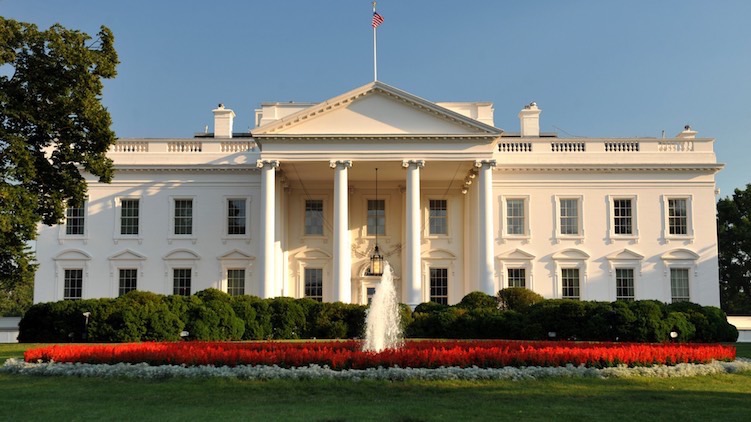Trump to Add Skype Seats to Briefing Room

The smarter way to stay on top of broadcasting and cable industry. Sign up below
You are now subscribed
Your newsletter sign-up was successful
A packed White House press room hosted the first Donald Trump Administration press conference Monday, not counting the weekend when spokesman Sean Spicer took to the rostrum to excoriate the media over inauguration crowd figures then left without taking questions, according to CNN.
At Monday's briefing, Spicer outlined some of President Donald Trump's first actions, including withdrawing the U.S. from the TPP (Trans-Pacific Partnership), a freeze on government hiring, and preventing funding of groups that back abortions overseas.
He also said that beginning later this week, there would be four “Skype seats” in the briefing room—for those outside 50 miles from D.C. or without a White House pass. The idea was to get more participation from outside the Beltway.
There had been some talk the briefing room might be moved to accommodate more folks, though it appears that will be done, at least at first, virtually.
Spicer said the President's meeting with CEOs Monday about what regulations were stopping them from conducting business, including with Michael Dell of Dell, would become a regular thing.
He also said he had met with union workers on "day one," saying the President's top priority was keeping and growing jobs.
Spicer had said he did not expect to overtake Josh Earnest as the press corps’ favorite White House spokesman, at least for the first few days.
The smarter way to stay on top of broadcasting and cable industry. Sign up below
Hollywood backed the TPP as a way to expand markets, but neither President Trump nor Hillary Clinton were TPP fans during the presidential election campaign.
Fox News' John Roberts, pointing out that Sen. John McCain (R-Ariz.) had said it was a mistake to pull out of the TPP, asked why the President thought it was a good idea. Spicer suggested that in multilateral agreements like TPP, any one of the countries (12 TPP countries in this case) has the same standing as the U.S. Spicer suggested that bilateral agreements were the way to best exercise the country's leverage in deals.
Spicer said that it was not a deal in the country's best interests. He said pulling out of the agreement is symbolic of a new era in trade policy that puts American workers first and foremost and a signal to the rest of the world that the U.S. needs "to get something out of these deals."
Asked if he will always tell the truth and pledge to be factual, Spicer said yes but that sometimes they can disagree with the facts. "Our intention is never to lie."
He said that sometimes the media makes a mistake and publishes a correction. "We should be afforded the same opportunity."
He said they will report the facts as they know them and correct them when they are wrong. He said the media misreports all the time but says he does not think they are intentionally lying.
He stood by his statement that Trump's inauguration was the most watched—which he said included combining in person and 31 million on TV and the others watching it on tablets and phones on Facebook and other live streaming.
Spicer called on CNN's Jim Acosta—who Trump would not call on in his first press conference after CNN's reporting on the Russia dossier—and said that President Trump had gone to the CIA to downplay "all the stuff on TV" about a rift with the CIA.
He also said there was an overall frustration with a narrative that Trump could not win, could not pick up this state, Rep. John Lewis (D-Ga.) is the first person to skip his inauguration, or about the missing MLK bust. He said it was frustrating not only for the President but his team.
He said he wanted to have a healthy dialog, but when you are constantly told in a TV narrative that stuff can't happen, it is demoralizing.
That is not just "the conversation in Washington," he told Acosta. "The default narrative is always negative, and it's demoralizing."
(Photo via Wikipedia. Image taken on Dec. 22, 2016 and used per Creative Commons 2.0 license. The photo was cropped to fit 3x4 aspect ratio.)
Contributing editor John Eggerton has been an editor and/or writer on media regulation, legislation and policy for over four decades, including covering the FCC, FTC, Congress, the major media trade associations, and the federal courts. In addition to Multichannel News and Broadcasting + Cable, his work has appeared in Radio World, TV Technology, TV Fax, This Week in Consumer Electronics, Variety and the Encyclopedia Britannica.

